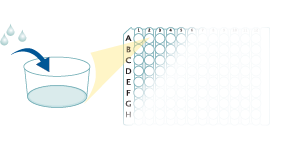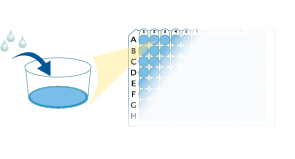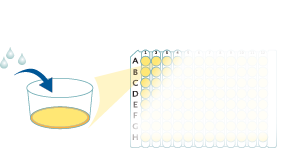Canine IL-10 Quantikine ELISA Kit Summary
Product Summary
Precision
Cell Culture Supernates, Serum, EDTA Plasma, Heparin Plasma
| Intra-Assay Precision | Inter-Assay Precision | |||||
|---|---|---|---|---|---|---|
| Sample | 1 | 2 | 3 | 1 | 2 | 3 |
| n | 20 | 20 | 20 | 20 | 20 | 20 |
| Mean (pg/mL) | 53 | 144 | 533 | 59 | 152 | 512 |
| Standard Deviation | 2.9 | 7 | 20.1 | 5.1 | 9.3 | 21 |
| CV% | 5.5 | 4.9 | 3.8 | 8.6 | 6.1 | 4.1 |
Recovery
The recovery of canine IL-10 spiked to levels throughout the range of the assay in various matrices was evaluated.
| Sample Type | Average % Recovery | Range % |
|---|---|---|
| Cell Culture Supernates (n=5) | 93 | 75-104 |
| EDTA Plasma (n=4) | 89 | 83-93 |
| Heparin Plasma (n=4) | 87 | 83-93 |
| Serum (n=5) | 96 | 80-107 |
Linearity
Scientific Data
Product Datasheets
Preparation and Storage
Background: IL-10
Interleukin-10 functions as an anti-inflammatory cytokine by inhibiting the expansion and activation of Th1 cells and Th17 cells and by promoting the development of M2 macrophages and regulatory T cells (Treg). Within a tumor microrenvironment, however, IL-10 can inhibit the expansion of both Treg and myeloid-derived suppressor cells (MDSC). IL-10 exerts protective effects including limiting tissue damage in arthritic inflammation and promoting muscle regeneration after injury, but it also contributes to the persistence of viral infections. IL-10 signals through a receptor complex composed of IL-10 R alpha and IL-10 R beta. IL-10 R beta additionally associates with IL-20 R alpha, IL-22 R alpha 1, or IL-28 R alpha to form the receptor complexes for IL-22, IL-26, IL-28, and IL-29.
Assay Procedure
Refer to the product- Prepare all reagents, standard dilutions, and samples as directed in the product insert.
- Remove excess microplate strips from the plate frame, return them to the foil pouch containing the desiccant pack, and reseal.
- Add 50 µL of Assay Diluent to each well.
- Add 50 µL of Standard, Control, or sample to each well. Cover with a plate sealer, and incubate at room temperature for 2 hours.
- Aspirate each well and wash, repeating the process 4 times for a total of 5 washes.
- Add 100 µL of Conjugate to each well. Cover with a new plate sealer, and incubate at room temperature for 2 hours.
- Aspirate and wash 5 times.
- Add 100 µL Substrate Solution to each well. Incubate at room temperature for 30 minutes. PROTECT FROM LIGHT.
- Add 100 µL of Stop Solution to each well. Gently tap the plate to ensure thorough mixing. Read at 450 nm within 30 minutes. Set wavelength correction to 540 nm or 570 nm.





Citations for Canine IL-10 Quantikine ELISA Kit
R&D Systems personnel manually curate a database that contains references using R&D Systems products. The data collected includes not only links to publications in PubMed, but also provides information about sample types, species, and experimental conditions.
13
Citations: Showing 1 - 10
Filter your results:
Filter by:
-
Mycobacterium intracellulare induces a Th17 immune response via M1-like macrophage polarization in canine peripheral blood mononuclear cells
Authors: S Kim, YS Hyun, HT Park, MK Shin, HS Yoo
Scientific Reports, 2022-07-12;12(1):11818.
Species: Canine
Sample Types: Cell Culture Supernates
-
Effect of Cannabidiol (CBD) on Canine Inflammatory Response: An Ex Vivo Study on LPS Stimulated Whole Blood
Authors: E Gugliandol, P Licata, AF Peritore, R Siracusa, R D'Amico, M Cordaro, R Fusco, D Impellizze, R Di Paola, S Cuzzocrea, R Crupi, CD Interlandi
Veterinary sciences, 2021-09-04;8(9):.
Species: Canine
Sample Types: Whole Blood
-
Effect of modified ultrafiltration on cytokines and hemoconcentration in dogs undergoing cardiopulmonary bypass
Authors: H Suzuki, N Oshima, T Watari
J Vet Med Sci, 2020-10-05;0(0):.
Species: Canine
Sample Types: Plasma
-
A preliminary study assessing cytokine production following ex vivo stimulation of whole blood with diet in dogs with chronic enteropathy
Authors: A Kathrani, E Hall
BMC Vet. Res., 2019-06-04;15(1):185.
Species: Canine
Sample Types: Cell Culture Supernates
-
Clinical Assessment of Intravenous Endothelial Progenitor Cell Transplantation in Dogs
Authors: SH Lee, JC Ra, HJ Oh, MJ Kim, EMN Setyawan, YB Choi, JW Yang, SK Kang, SH Han, GA Kim, BC Lee
Cell Transplant, 2019-04-24;0(0):9636897188216.
Species: Canine
Sample Types: Serum
-
Zoonotic intestinal helminths interact with the canine immune system by modulating T cell responses and preventing dendritic cell maturation
Authors: J Junginger, K Raue, K Wolf, E Janecek, VM Stein, A Tipold, AR Günzel-Ape, C Strube, M Hewicker-T
Sci Rep, 2017-09-04;7(1):10310.
Species: Canine
Sample Types: Cell Culture Supernates
-
Higher neonatal growth rate and body condition score at 7�months are predictive factors of obesity in adult female Beagle dogs
Authors: L Leclerc, C Thorin, J Flanagan, V Biourge, S Serisier, P Nguyen
BMC Vet. Res., 2017-04-13;13(1):104.
Species: Canine
Sample Types: Plasma
-
Immunometabolic parameters in overweight dogs during weight loss with or without an exercise program
Authors: C R Bjørnvad
Domest. Anim. Endocrinol., 2016-11-11;59(0):58-66.
Species: Canine
Sample Types: Plasma
-
Use of a recombinant cysteine proteinase from Leishmania (Leishmania) infantum chagasi for the Immunotherapy of canine visceral Leishmaniasis.
Authors: Ferreira J, Silva L, Longo-Maugeri I, Katz S, Barbieri C
PLoS Negl Trop Dis, 2014-03-13;8(3):e2729.
Species: Canine
Sample Types: Serum
-
Programmed death 1-mediated T cell exhaustion during visceral leishmaniasis impairs phagocyte function.
Authors: Esch K, Juelsgaard R, Martinez P, Jones D, Petersen C
J Immunol, 2013-10-23;191(11):5542-50.
Species: Canine
Sample Types: Cell Culture Supernates
-
Clinical, parasitologic, and immunologic evolution in dogs experimentally infected with sand fly-derived Leishmania chagasi promastigotes.
Authors: Travi BL, Osorio EY, Saldarriaga OA
Am. J. Trop. Med. Hyg., 2009-12-01;81(6):994-1003.
Species: Canine
Sample Types: Cell Culture Supernates
-
A functional comparison of canine and murine bone marrow derived cultured mast cells.
Authors: Lin TY, London CA
Vet. Immunol. Immunopathol., 2006-10-06;114(3):320-34.
Species: Canine
Sample Types: Cell Culture Supernates
-
Measurement of serum interleukin-10 in the dog.
Authors: Kjelgaard-Hansen M, Luntang-Jensen M, Willesen J, Jensen AL
Vet. J., 2006-02-03;173(2):361-5.
Species: Canine
Sample Types: Serum
FAQs
-
Assay Diluent RD1-14 contains visible precipitate. Is this acceptable to use?
A small amount of precipitate is expected and acceptable in Assay Diluent RD1-14. Variability has been observed between vials and diluent lots. It may not fully resolubilize but this will not impact assay performance. It is not recommended to filter the precipitate.
Reviews for Canine IL-10 Quantikine ELISA Kit
Average Rating: 5 (Based on 2 Reviews)
Have you used Canine IL-10 Quantikine ELISA Kit?
Submit a review and receive an Amazon gift card.
$25/€18/£15/$25CAN/¥75 Yuan/¥2500 Yen for a review with an image
$10/€7/£6/$10 CAD/¥70 Yuan/¥1110 Yen for a review without an image
Filter by:











